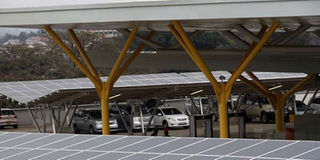New plan to drive down the cost of solar power

Solar panels during the launch of Africa’s largest solar carport system at the Garden City Mall in Nairobi last year. PHOTO | FILE | NATION MEDIA GROUP.
What you need to know:
- London-based Solarcentury, a developer of solar farms, says the new system of energy auctions to the lowest bidder is likely to bring down the cost of solar to about 8 US cents per kilowatt-hour from the present feed-in-tariff of 12 US cent per kWh.
- Solarcentury has developed 4 megawatts of solar power in Kenya including an 858kW peak carport solar plant at Garden City Mall and Williamson Tea (1MW).
- President Uhuru Kenyatta is banking on energy auctions for clean and cheaper energy sources to halve the cost of electricity to Sh10 per kWh (10.45 US cents) from the current average of Sh20 (9.78 US cents) per unit for domestic households.
Kenya’s grid-connected solar power costs are projected to drop by a third under a proposed auctions regime to replace the current fixed tariffs.
London-based Solarcentury, a developer of solar farms, says the new system of energy auctions to the lowest bidder is likely to bring down the cost of solar to about 8 US cents per kilowatt-hour from the present feed-in-tariff of 12 US cent per kWh.
Energy Regulatory Commission director general Joe Ng’ang’a said the shift to hold competitive auctions for generation projects is to drive down the cost of electricity.
“Everywhere an auction has been done the prices have reduced drastically. Price discovery and competition is the best market regulator,” Mr Ng’ang’a said in an interview.
The Ministry of Energy last month announced that it will adopt a World Bank model that swaps fixed prices for auction sales where developers with the lowest bid set up power plants.
Strathmore University is Kenya’s first and only grid-connected solar energy producer, selling 0.25 megawatts to Kenya Power since October last year.
Solarcentury East Africa director Guy Lawrence said achieving 8 cents to 9 cents per kWh for solar “shouldn’t be too difficult” under an auction model, given the drop in cost of materials, use of refined technology, and availability of funds from financiers.
“It is unlikely that the auction prices would be higher than the current tariff,” said Mr Lawrence.
“Solar power costs are tumbling fast. It is set to fall further as technology efficiencies improve.”
Solarcentury has developed 4 megawatts of solar power in Kenya including an 858kW peak carport solar plant at Garden City Mall and Williamson Tea (1MW).
Zambia model
Kenya is following in the footsteps of Zambia which in June held Africa’s inaugural solar auction that attracted rock bottom prices: 6.02 US cents per kWh for a 45MW solar farm and another 7.84 US cents per kWh for a 28MW plant as winners.
Zambia model
However, the Zambia model involves the State providing land for the solar farm, with the government meeting the legal costs, substation and lines. The World Bank’s International Finance Corporation provides financial guarantees under this framework.
President Uhuru Kenyatta is banking on energy auctions for clean and cheaper energy sources to halve the cost of electricity to Sh10 per kWh (10.45 US cents) from the current average of Sh20 (9.78 US cents) per unit for domestic households.
The shift to auctions comes at a time Kenya has already signed 20-year power purchase agreements with nearly a dozen investors expected to build grid-connected solar farms.
The pipeline of solar projects will see Kenya inject 325MW to the national grid from sunlight, deepening Nairobi’s uptake of cheaper and renewable energy sources including geothermal, wind, hydro and biomass.
The planned solar farms, expected to be complete by 2018 include a giant 55MW plant in Garissa, 40MW plant in Malindi, a 30MW facility in Makueni and a 10MW farm at Gitaru.
There are a further five solar plants each with a capacity of 40MW and located in Rumuruti, Kesses in Eldoret and Kibos.
Quint Power has also received regulatory approval to develop a 40MW solar farm at Nyakwere hills in Sondu Miriu.
The planned 10MW solar plant at Gitaru will mark KenGen’s entry into generating solar. The solar farm is located at Gitaru which is KenGen’s largest hydro power station with an installed capacity of 225MW.




